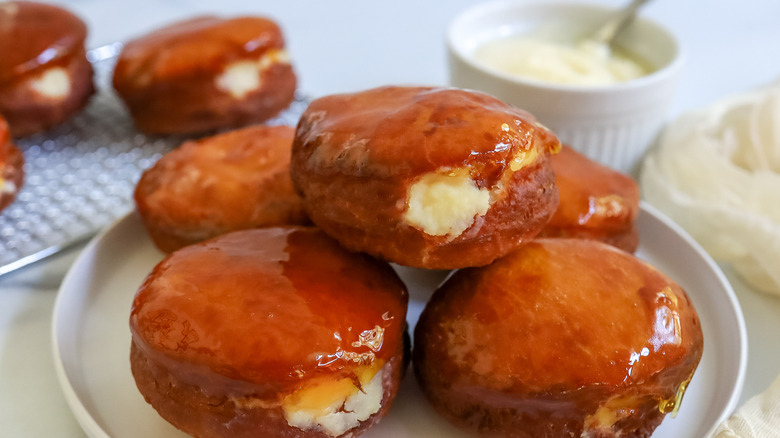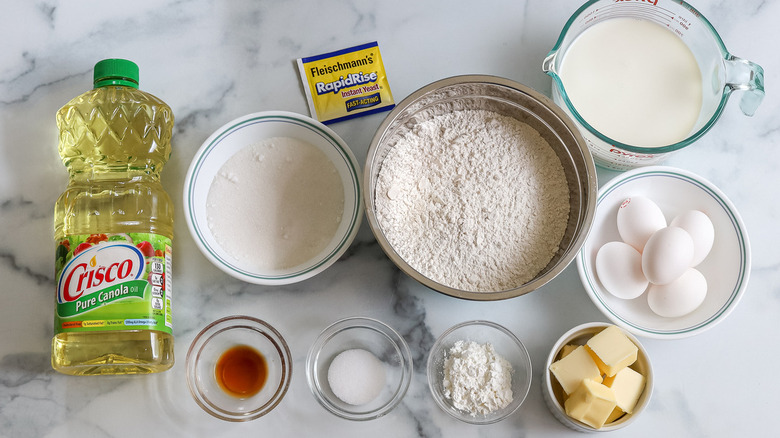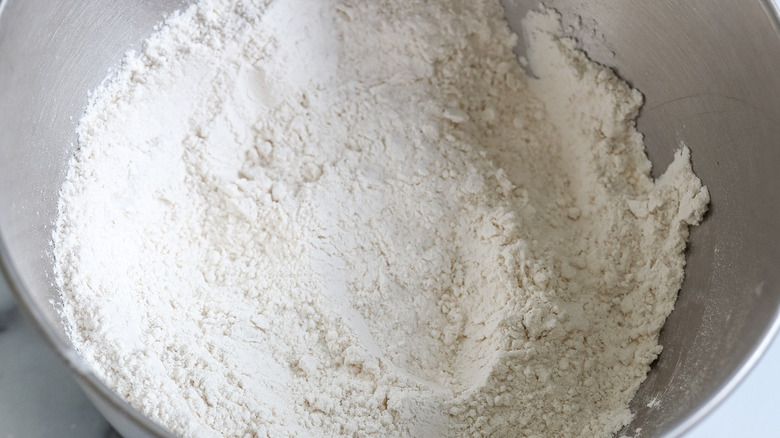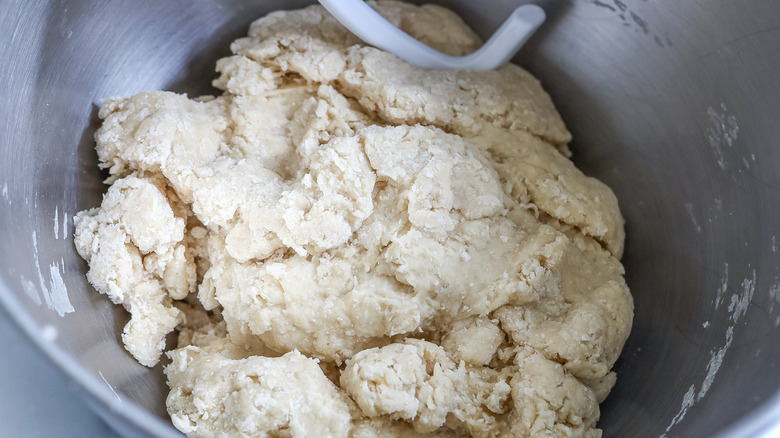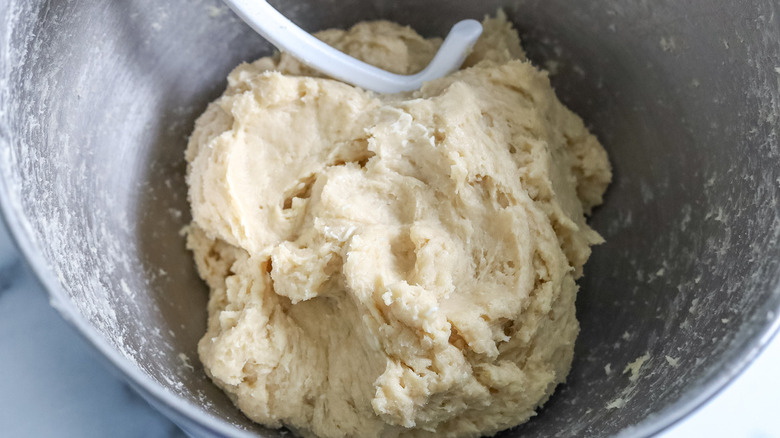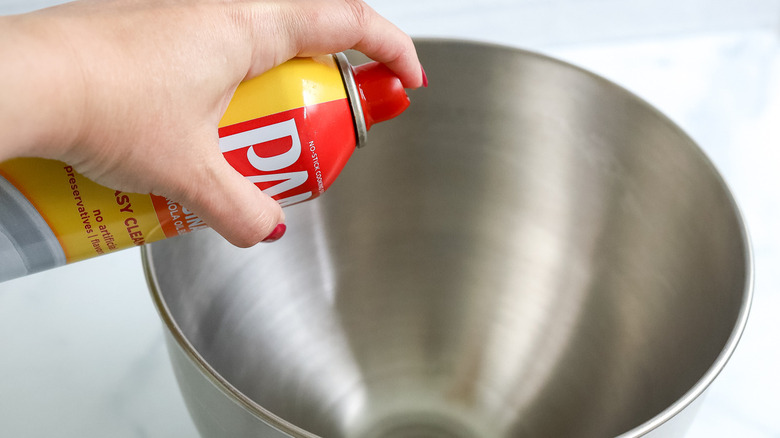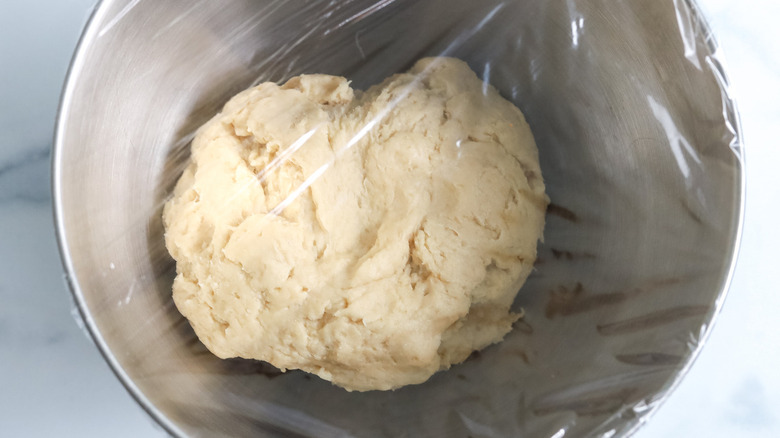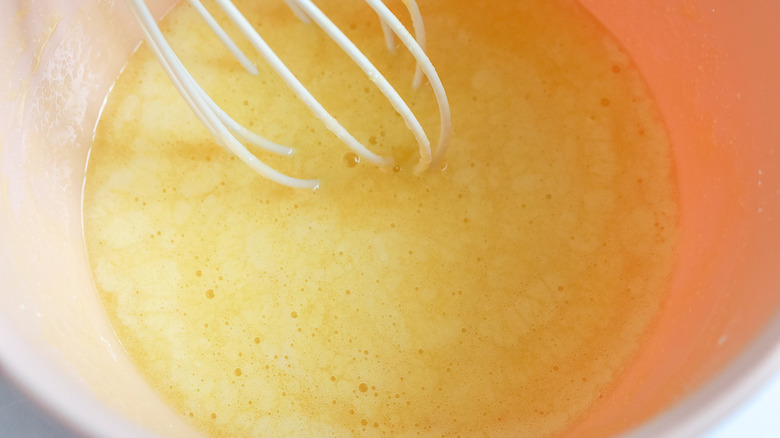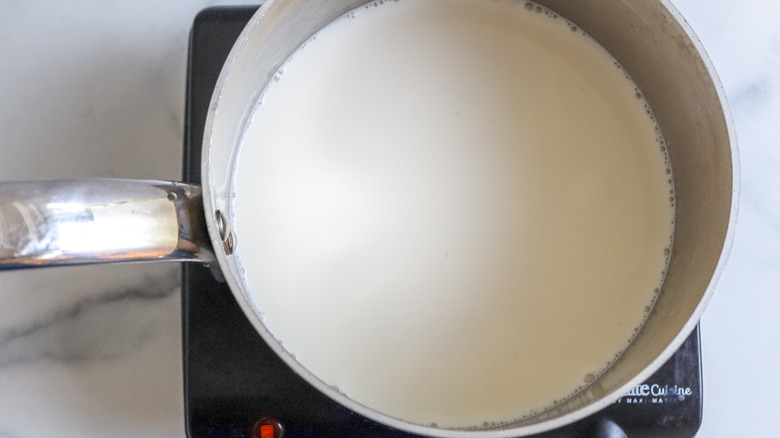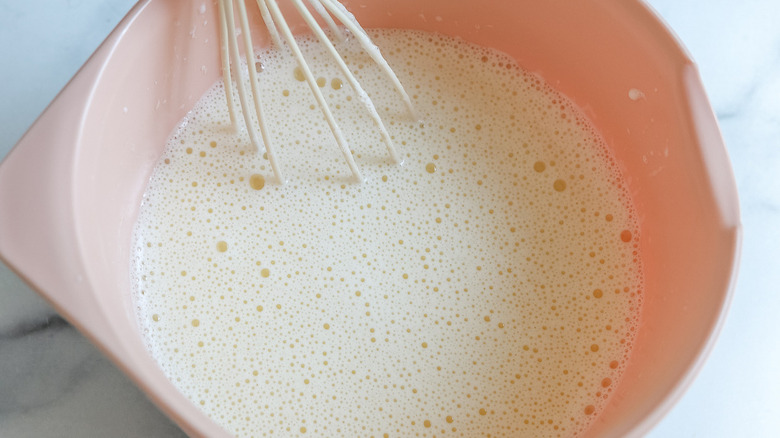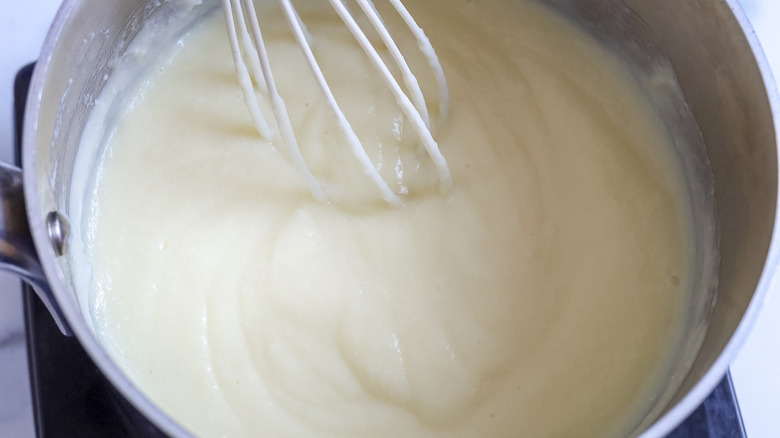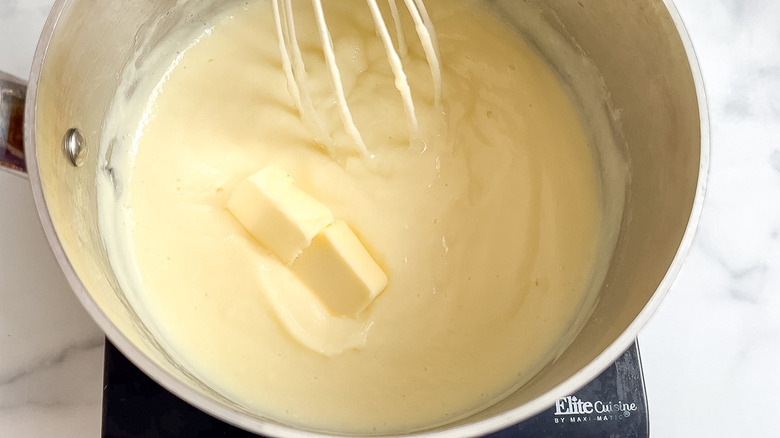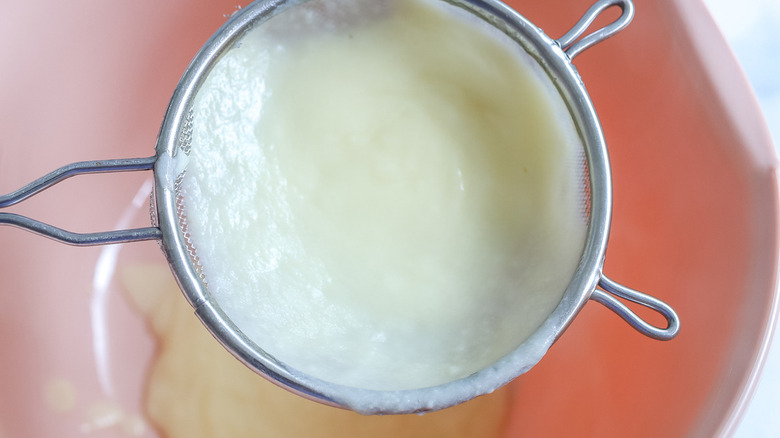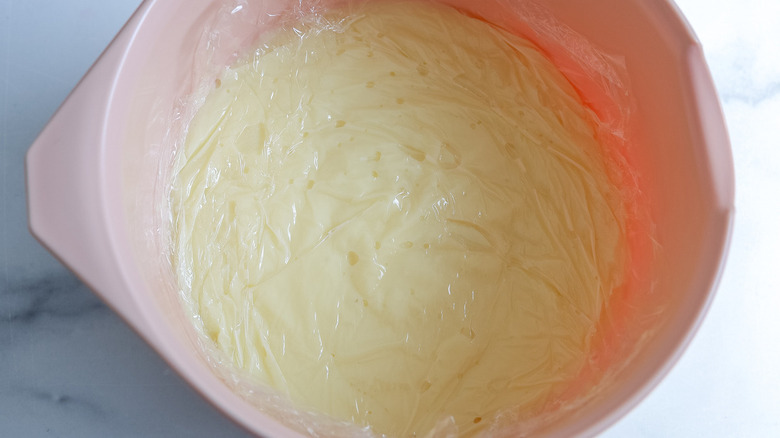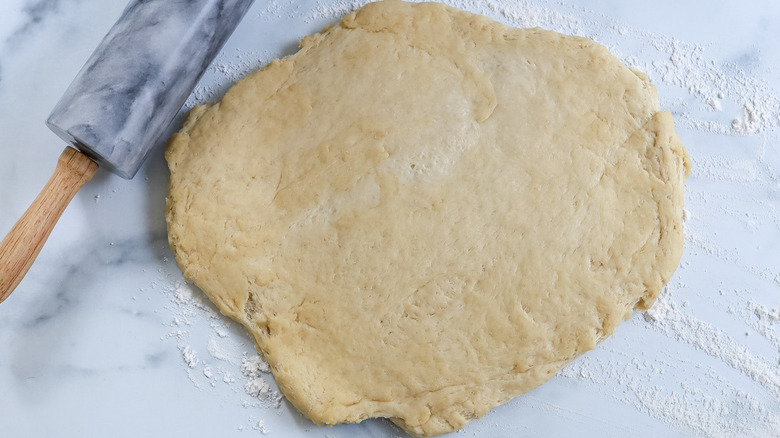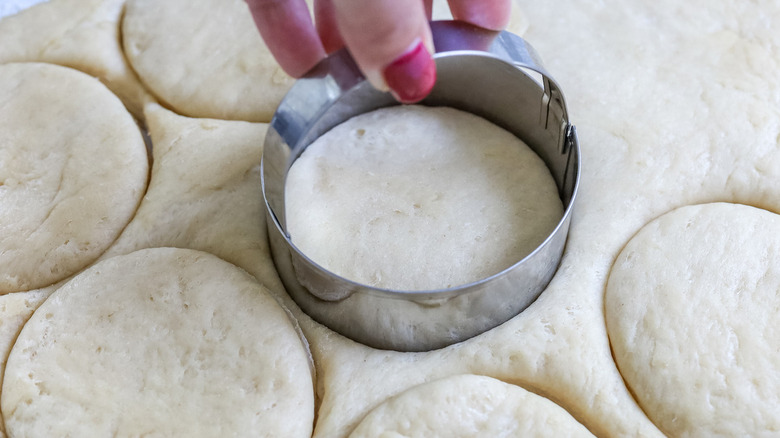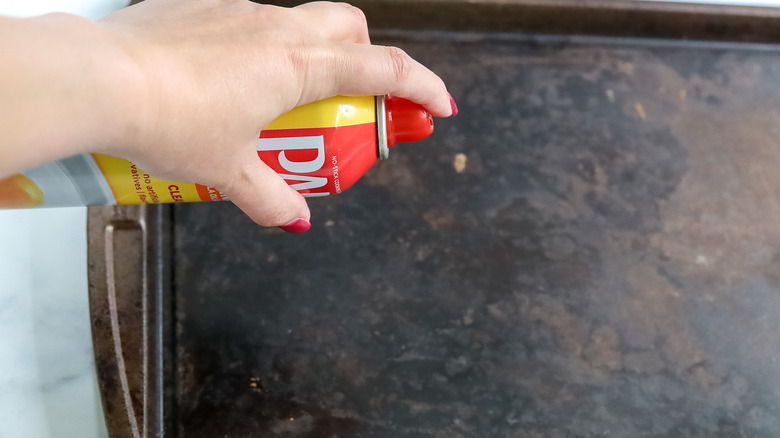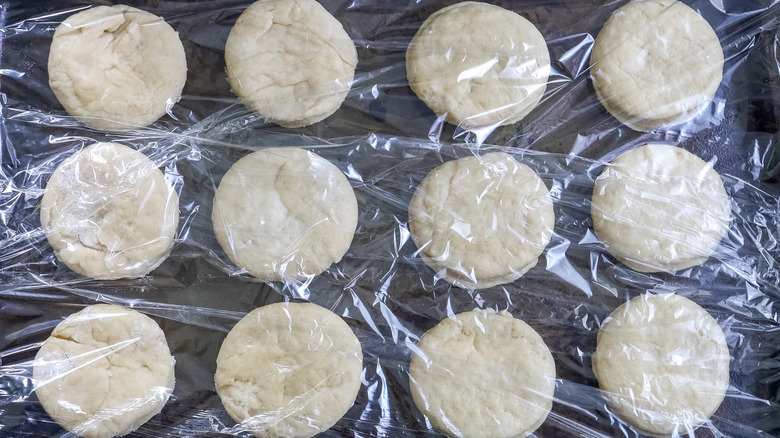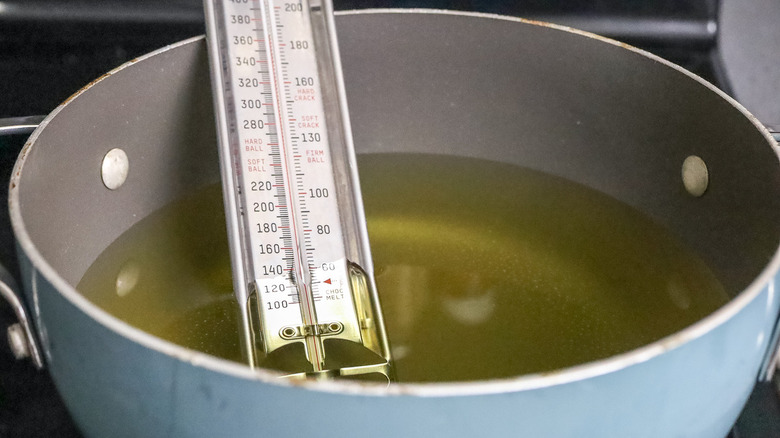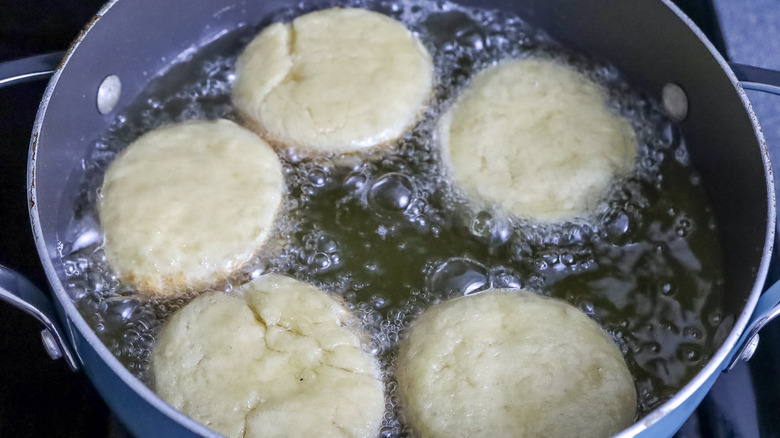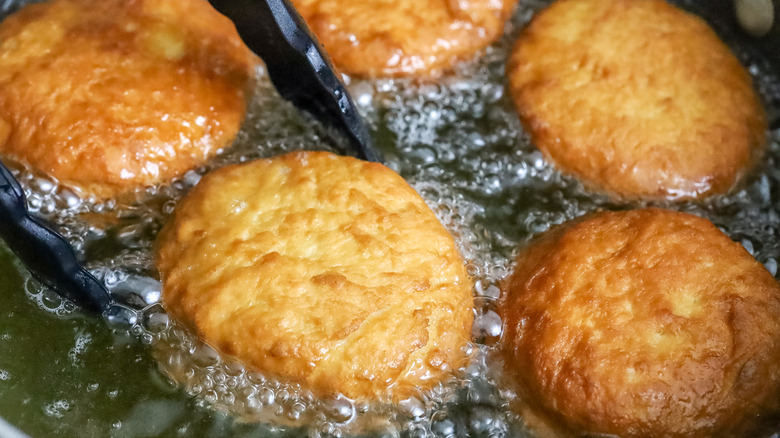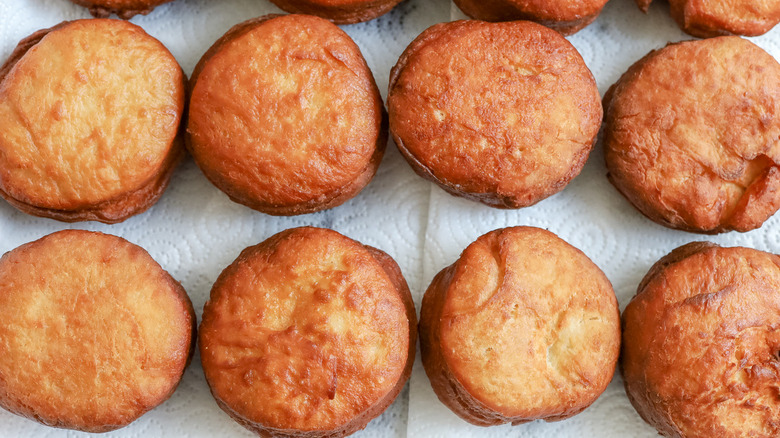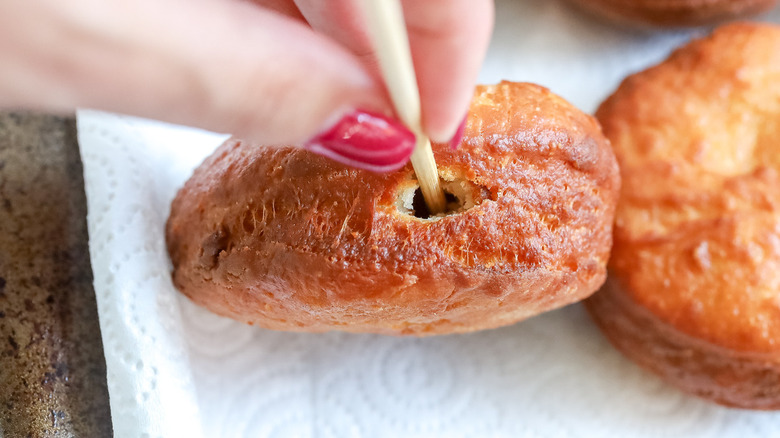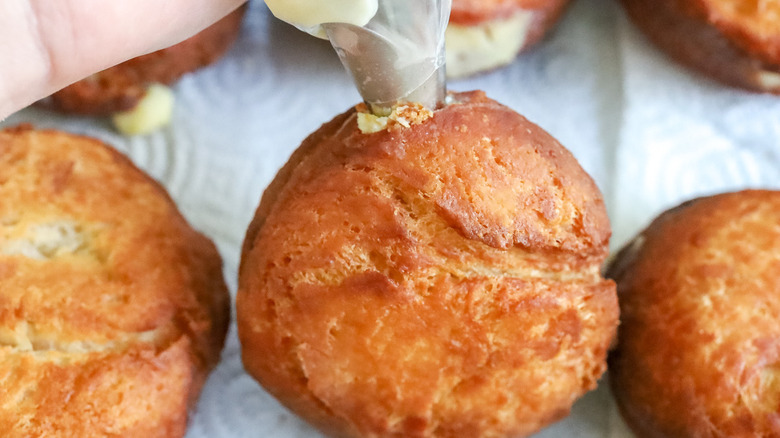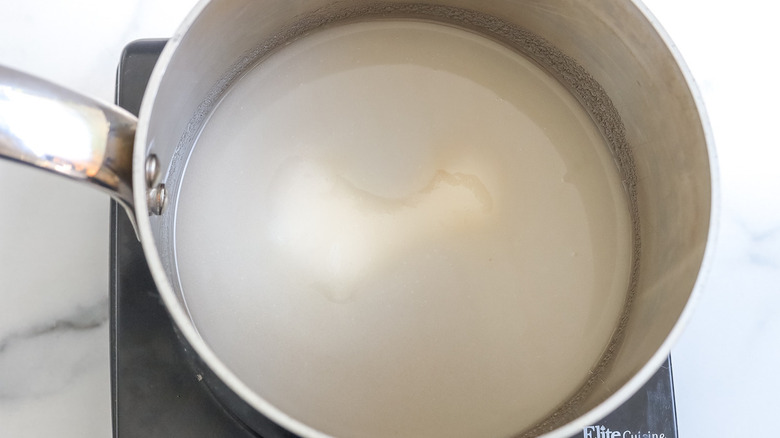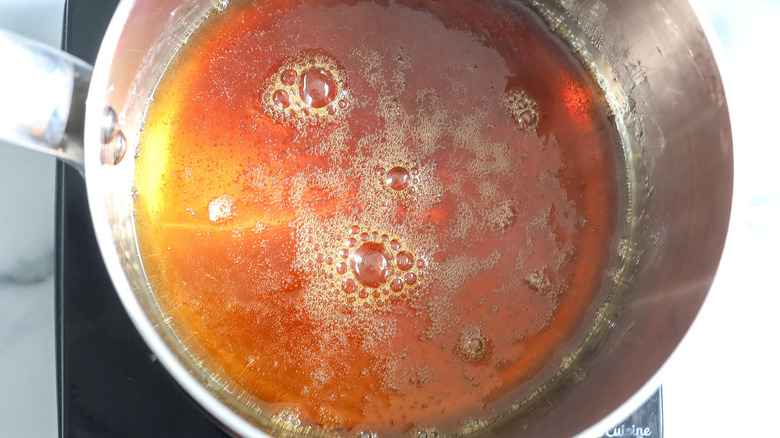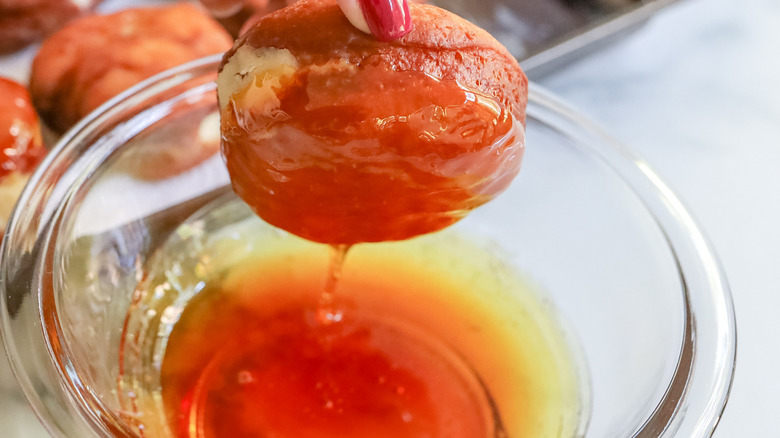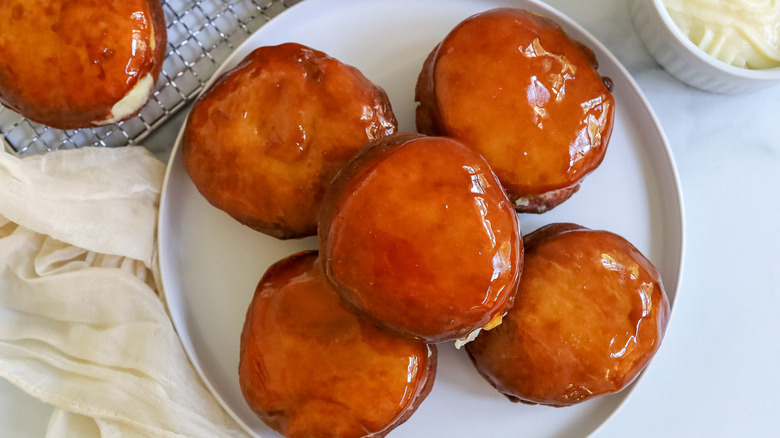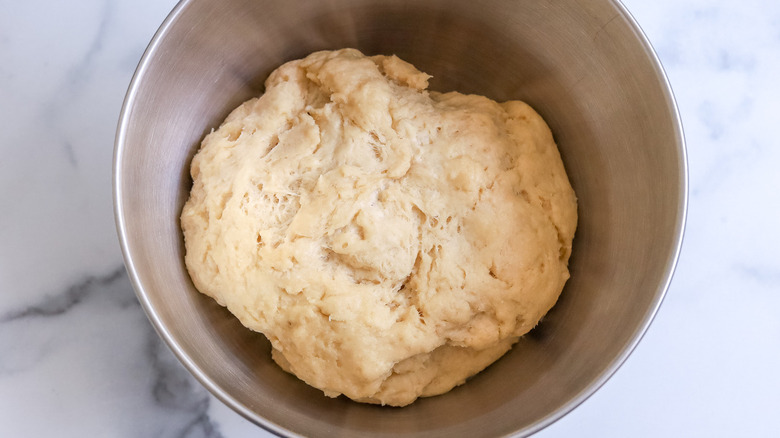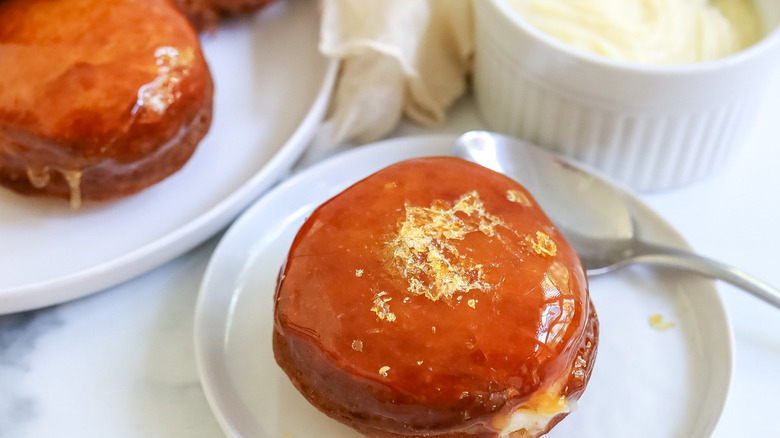Crème Brûlée Donuts Recipe
Recipe developer Jessica Morone tells us that donuts are her absolute favorite dessert, and she loves to create recipes that transform other desserts into donut form. She's come up with such creations as the carrot cake donut, the caramel apple donut, and the pumpkin pie donut, and here she's tackling an iconic French dessert.
Crème Brûlée is an enduring favorite with good reason: There's nothing quite like breaking that crisp sugary coating and revealing the soft custardy interior. With this donut mashup, Morone tells us, "You do get the same sensation of eating an actual crème brûlée while you eat these. You crack through the crunchy caramel and bite into a light creamy vanilla center." The fact that it's all packaged in a lightly-sweet freshly-made donut might just make it the perfect treat.
Donuts, like most fried foods, are glorious when they're hot and fresh, but alas, they get soggy if you don't finish them off in short order. Morone suggests a clever solution: Whether you want to avoid too many leftovers or you want to get a head start on this somewhat involved recipe, you can make the dough and fry the donuts, then freeze them for up to three months before filling and glazing them. The pastry cream, too, could be prepared in advance, but it's best to make it within three days of using it since it won't freeze well and will only last three days in the fridge.
Collect the ingredients for the crème brûlée donuts
The donut dough is made with yeast, flour, sugar, salt, whole milk, eggs, and butter. You'll also need cornstarch and vanilla extract for the filling as well as canola or vegetable oil for frying.
Step 1: Combine the dry ingredients for the dough
In the bowl of a stand mixer fitted with the dough hook attachment, stir together the yeast, flour, sugar, and salt until combined.
Step 2: Add the milk and eggs
Add the lukewarm milk and eggs and mix on low speed until the dough comes together (2-3 minutes).
Step 3: Beat in the butter
Mix in the butter until fully incorporated and continue mixing on low until a soft dough forms (another 2-3 minutes).
Step 4: Grease a bowl
Lightly grease a clean bowl.
Step 5: Let the dough rise
Add the dough to the greased bowl and cover with plastic wrap. Let sit in a warm place until the dough has doubled in size, 1-2 hours.
Step 6: Start the pastry cream
While the dough is rising, make the pastry cream. In a medium bowl whisk together the eggs, sugar, cornstarch, and salt.
Step 7: Steam the milk with the vanilla
Heat the milk and vanilla extract in a medium saucepan over medium heat until bubbles just start to form around the edges and the milk is steaming, but do not boil.
Step 8: Stir the milk into the egg mixture
Whisking continuously, carefully pour the milk mixture into the bowl with the eggs until well combined.
Step 9: Boil the pastry cream
Pour the mixture back into the saucepan and heat over medium heat, whisking constantly until the mixture thickens and comes to a boil, then boil for an additional 15 seconds until the cream is thick and glossy.
Step 10: Add the butter
Remove from the heat, then add in the butter and mix until melted and combined.
Step 11: Strain the cream
Pass the cream through a strainer over a bowl to make sure there are no lumps.
Step 12: Chill the cream
Cover the bowl with plastic wrap, pressing the plastic wrap against the surface of the pastry cream to prevent a skin from forming. Refrigerate until chilled, at least 1 hour.
Step 13: Roll out the dough
Once the donut dough has risen, turn it out onto a lightly floured surface and roll it out until it is about ½ inch thick.
Step 14: Cut the dough in circles
Use a 3-inch lightly-floured biscuit cutter (or the edge of a glass) to cut rounds from the dough. Knead and roll out the remaining dough and continue rolling and cutting rounds until you have used all the dough.
Step 15: Prepare a pan
Lightly grease a large baking pan.
Step 16: Let the dough rise again
Place the cut-out rounds on the greased baking sheet. Cover with plastic wrap or a kitchen towel and allow them to rise for about an hour until doubled in size.
Step 17: Heat the oil
Fill a large, heavy-bottomed pan with 3 inches of oil and heat over medium-high heat until it reaches 360 F.
Step 18: Put the donuts in the oil
Carefully lower the donuts into the hot oil, making sure not to overcrowd the pan.
Step 19: Fry the donuts
Fry each side until golden brown, about 1-2 minutes a side.
Step 20: Drain the donuts
Remove the donuts to a paper towel-lined baking sheet. Repeat with all the remaining donut dough.
Step 21: Poke a hole in each donut
Once the donuts are completely cool, use a skewer or a chopstick to create a hole in the side of the donuts and a pocket inside the donuts for the cream.
Step 22: Fill the donuts with cream
Transfer the pastry cream to a pastry bag fitted with a piping tip. Fill the donuts with the cream until they feel heavy.
Step 23: Combine the ingredients for the topping
In a medium, light-colored saucepan mix together the sugar, water, and salt.
Step 24: Cook the caramel
Heat on low heat until the sugar dissolves and the caramel reaches a golden color. Remove from the heat and immediately transfer the caramel to a separate small bowl.
Step 25: Dip the donuts
While still hot, carefully dip the tops of the donuts in the brûlée coating so they get a thin coating on top (Note: coating will be incredibly hot, be very careful and consider wearing gloves to protect your fingers).
Step 26: Allow the topping to harden
Let the caramel sit until it hardens, then serve the donuts.
Crème Brûlée Donuts Recipe
All the pleasure of eating crème brûlée but in freshly-made donut form: You crack through the crunchy caramel and bite into a light creamy vanilla center.
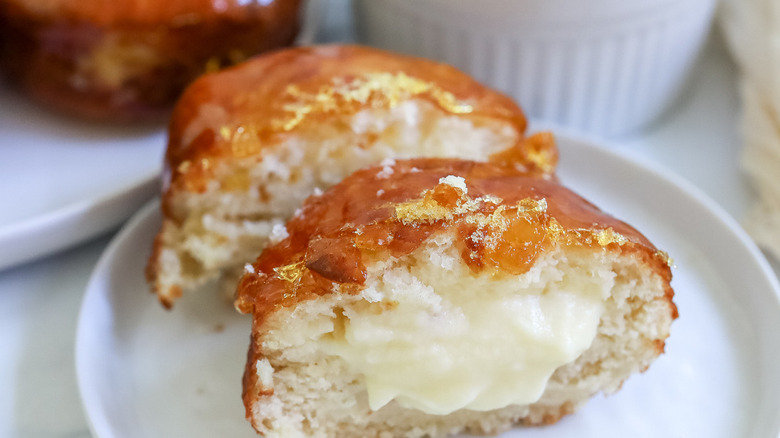
Ingredients
- :::For the donuts::
- 2¼ teaspoons (one packet) instant yeast
- 3½ cups all-purpose flour
- ⅓ cup granulated sugar
- 1½ teaspoons salt
- ⅔ cup whole milk, lukewarm
- 3 eggs
- 6 tablespoons unsalted butter, at room temperature
- For the pastry cream
- 2 eggs
- ½ cup granulated sugar
- 2 tablespoons cornstarch
- ½ teaspoon salt
- 2 cups whole milk
- 1 teaspoon vanilla extract
- 2 tablespoons unsalted butter
- For the brûlée coating
- 1 cup sugar
- ¼ cup water
- ⅛ teaspoon salt
- For Frying
- Canola or vegetable oil
Directions
- In the bowl of a stand mixer fitted with the dough hook attachment, stir together the yeast, flour, sugar, and salt until combined.
- Add the lukewarm milk and eggs and mix on low speed until the dough comes together (2-3 minutes).
- Mix in the butter until fully incorporated and continue mixing on low until a soft dough forms (another 2-3 minutes).
- Lightly grease a clean bowl.
- Add the dough to the greased bowl and cover with plastic wrap. Let sit in a warm place until the dough has doubled in size, 1-2 hours.
- While the dough is rising, make the pastry cream. In a medium bowl whisk together the eggs, sugar, cornstarch, and salt.
- Heat the milk and vanilla extract in a medium saucepan over medium heat until bubbles just start to form around the edges and the milk is steaming, but do not boil.
- Whisking continuously, carefully pour the milk mixture into the bowl with the eggs until well combined.
- Pour the mixture back into the saucepan and heat over medium heat, whisking constantly until the mixture thickens and comes to a boil, then boil for an additional 15 seconds until the cream is thick and glossy.
- Remove from the heat, then add in the butter and mix until melted and combined.
- Pass the cream through a strainer over a bowl to make sure there are no lumps.
- Cover the bowl with plastic wrap, pressing the plastic wrap against the surface of the pastry cream to prevent a skin from forming. Refrigerate until chilled, at least 1 hour.
- Once the donut dough has risen, turn it out onto a lightly floured surface and roll it out until it is about ½ inch thick.
- Use a 3-inch lightly-floured biscuit cutter (or the edge of a glass) to cut rounds from the dough. Knead and roll out the remaining dough and continue rolling and cutting rounds until you have used all the dough.
- Lightly grease a large baking pan.
- Place the cut-out rounds on the greased baking sheet. Cover with plastic wrap or a kitchen towel and allow them to rise for about an hour until doubled in size.
- Fill a large, heavy-bottomed pan with 3 inches of oil and heat over medium-high heat until it reaches 360 F.
- Carefully lower the donuts into the hot oil, making sure not to overcrowd the pan.
- Fry each side until golden brown, about 1-2 minutes a side.
- Remove the donuts to a paper towel-lined baking sheet. Repeat with all the remaining donut dough.
- Once the donuts are completely cool, use a skewer or a chopstick to create a hole in the side of the donuts and a pocket inside the donuts for the cream.
- Transfer the pastry cream to a pastry bag fitted with a piping tip. Fill the donuts with the cream until they feel heavy.
- In a medium, light-colored saucepan mix together the sugar, water, and salt.
- Heat on low heat until the sugar dissolves and the caramel reaches a golden color. Remove from the heat and immediately transfer the caramel to a separate small bowl.
- While still hot, carefully dip the tops of the donuts in the brûlée coating so they get a thin coating on top (Note: coating will be incredibly hot, be very careful and consider wearing gloves to protect your fingers).
- Let the caramel sit until it hardens, then serve the donuts.
Nutrition
| Calories per Serving | 405 |
| Total Fat | 13.7 g |
| Saturated Fat | 6.6 g |
| Trans Fat | 0.0 g |
| Cholesterol | 92.4 mg |
| Total Carbohydrates | 62.7 g |
| Dietary Fiber | 1.2 g |
| Total Sugars | 33.4 g |
| Sodium | 367.7 mg |
| Protein | 8.1 g |
What are some tips for making perfect crème brûlée donuts?
These donuts start with yeasted dough, and in order for it to work, the temperature of the milk is key. Use a thermometer to make sure it's right around 110 F, since if it's much cooler, the yeast won't activate, but if it gets any hotter, the yeast might die. Once you've made the dough, it needs a warm, draft-free place to rise, and the inside of your oven is a good place for this. If your house is cold, preheat the oven to its lowest setting, then turn off the heat before putting the dough bowl into this nice warm chamber.
When you're making the cream, it's important to keep whisking as you add the eggs to the milk since that will prevent the mixture from curdling. Once you return the pastry cream to the stove, be sure it comes to a boil, since this is what activates the cornstarch and lets it work its thickening magic.
As for frying, once again, you'll need to keep an eye on the temperature, so a thermometer is a must-have. Keep the oil right around 360 F, because if it gets much hotter, your donuts will still be raw inside by the time the outsides are done. If the oil is too cold, though, the donuts will take longer to cook and absorb more oil, which will make them greasy and soggy.
How can I keep my brûlée coating from burning?
Even when you've fried the donuts and made the pastry cream, there's one more hurdle to get over: cooking the caramel syrup for the brûlée. While this topping isn't difficult to make, it's important to keep a close eye on it since it takes just seconds for the syrup to go from just right to burnt. You need to achieve just the right balance so that it's caramelized enough to set and turn crispy, but not so much that it turns black and hard. You don't need a candy thermometer for this, just a watchful eye. Keep the burner set to medium-low, and once the sugar dissolves, get ready to take the pan off the heat as soon as the syrup turns golden brown. Make sure you have a clean bowl to pour it into, since even the residual heat from the pan may be enough to burn the syrup.
Dip the donuts in the caramel while it's still hot since this will allow for a nice, even coating. The topping will thicken as it cools, though, so you may need to heat it for 20 seconds in the microwave to thin it out. One additional tip for brûléeing is to wear heat-proof kitchen gloves while you dip the donuts. Morone says she forgot this step and burnt herself several times on the hot sugar, which is an experience she doesn't recommend.
